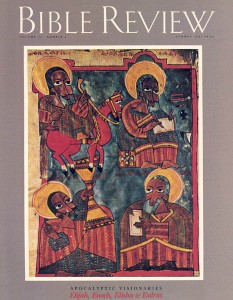Debate On Enoch Stifled For 30 Years While One Scholar Studied Dead Sea Scroll Fragments
Sidebar to: Don’t Let Pseudepigrapha Scare You
Father J. T. Milik took nearly 30 years to publish the fragments from the pseudepigraphic Book of Enoch found in the Dead Sea Scroll caves in the 1950s. During those years, other scholars were not allowed to study and write about these highly significant documents, which affect our understanding of the history of Judaism and Christianity.
Why couldn’t other scholars study and write about them, the incredulous layperson will ask. Because of a foolish scholarly convention, which states that until a scholar assigned to publish a manuscript actually publishes, no one else can do so—even if it takes nearly 30 years!
It’s hard to justify such a ridiculous convention, and many scholars have spoken out against it in recent years.a The usual justification for it is that it encourages a thorough study of a document before rushing into print.
In the case of the Enoch fragments, Milik announced to the scholarly world as early as the 1950s that the fragments of 1 Enoch 37–71 that he held under wraps would be shown in his publication to be a Christian, not a Jewish, composition, and that this section of the book could be dated sometime after the New Testament period. In the words of Professor James H. Charlesworth of Princeton Theological Seminary:
“Since the 50s J. T. Milik promised us he could prove that 1 Enoch 37–71 is not Jewish, but indeed a Christian composition that considerably postdates the New Testament period (50–150).”
Already a library member? Log in here.
Institution user? Log in with your IP address.

